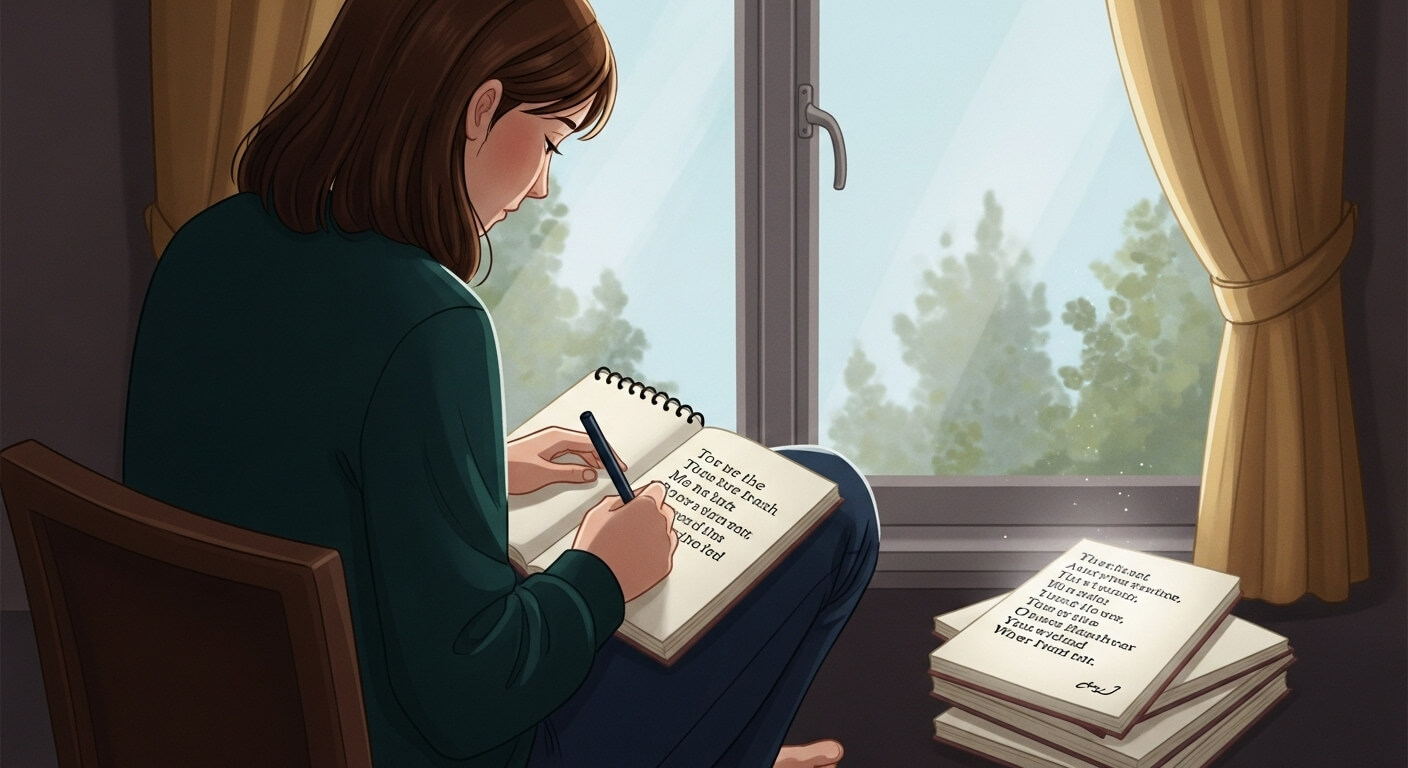
Writing a book of poetry isn’t just about rhymes and metaphors. It’s about capturing moments, bottling emotions, and giving language to the things we usually leave unspoken. Whether you want to explore pain, passion, nature, or memory, this guide will show you how to shape your voice into a powerful book of poems.
Poetry is a form of truth-telling. It reveals what’s hidden beneath silence and translates your thoughts into rhythm, imagery, and music. A poetry book lets you speak not only for yourself but often for others who haven’t yet found their voice. Through these pages, you’ll learn how to craft your ideas into verse, unify your poems into a collection, and create something that resonates long after the last line is read.
Table of Contents
Toggle🌿 The Soul of a Poetry Book: What It Is
Unlike a novel or a memoir, a poetry book isn’t driven by plot—it’s driven by feeling, theme, and tone. It’s an emotional architecture made of stanzas, silences, and sparks.
A poetry book is often:
- A collection of emotionally resonant themes
- A structured yet flexible body of individual poems
- A mirror of your inner voice and personal rhythm
Think of it not as chapters, but as a curated gallery where each poem is a painting that speaks to a shared story.
📚 Table: Key Components of a Poetry Book
|
✍️ Finding Your Voice Before You Find the Poems
Before you begin to write, find your poetic voice. It’s the sound of your soul—clear, cracked, urgent, or soft. It may come from your culture, upbringing, language, heartbreaks, or dreams.
Ask yourself:
- What emotions do I return to again and again?
- What topics do I want to explore over 40–60 pages?
- Do I gravitate toward sharp, minimalist language or rich, rhythmic lines?
🎧 Try this: Record yourself reading poems by others. Notice what cadence and styles feel most “you.”
🧱 Building the Book, One Poem at a Time
Don’t try to write a “book” from the start. Write poems, one by one. Let them stand alone first. Once you have at least 30–50 solid pieces, then begin to imagine the shape of the whole.
Tips to guide your writing process:
- Write without judgment—edit later.
- Explore multiple poetic forms: haikus, sonnets, free verse, prose poems.
- Use repetition, surprise, metaphor, and line breaks to make your language move.
- Revisit old drafts and rewrite them through a new emotional lens.
🌀 Order, Flow & Emotional Arc
Once you have a pile of poems, you need to arrange them like music. You want tension, release, pacing, contrast, and harmony.
💡 Think of your book like a mixtape:
- Open with impact
- Weave between light and dark
- End with a whisper or a wildfire
You can group poems into titled sections or let them flow without borders. Just make sure they talk to one another.
📖 Editing Your Poems into a Book
Editing a poetry book requires more than fixing typos. It’s about shaping cohesion, clarity, and depth. You’re not just polishing individual poems—you’re sculpting a complete experience.
Whether your genre leans toward romantic, confessional, nature-inspired, or experimental poetry, editing helps unify the tone, refine the rhythm, and eliminate distractions. It ensures every piece fits into the emotional and thematic arc of the book. Sometimes that means cutting a beloved line or reworking a verse that doesn’t flow. Strong editing transforms a good collection into a compelling, lasting work of art.
What to look for when editing:
- Repetition in ideas or imagery—cut or combine
- Inconsistencies in tone or voice
- Weak or cliché lines—replace with rawer, truer ones
- Clunky transitions between poems
🎯 Pro tip: Read your poems aloud to hear the music. If it stumbles in the mouth, it needs rewriting.
🎨 Titles, Themes, and the Visual Vibe
A good poetry book feels curated—not random. Even if your poems vary in subject, your title, theme, and layout should tie everything together with intention and emotional consistency, guiding the reader through a meaningful journey that feels deliberate, thoughtful, and complete.
Consider:
- A compelling book title that captures your core feeling or theme
- Section headings that guide the reader emotionally
- Minimal or creative visual design to support the content (fonts, spacing, cover image)
📦 Publishing: The Routes to Consider
You have two major paths: traditional publishing or self-publishing.
Traditional Publishing
- Submit to small poetry presses or contests
- Often takes 6–12 months to hear back
- Might come with editing, design, and marketing support
Self-Publishing
- More control over content, design, and timeline
- Great if you already have an audience
- Use platforms like Amazon KDP, IngramSpark, or Lulu
📣 Getting Your Book into the World
Even poetry needs a little promotion.
Try these:
- Share excerpts on Instagram or Threads
- Submit your poems to literary journals for exposure
- Host a virtual or local launch event
- Record an audiobook version of selected poems
Let your poetry echo in multiple places—not just in print.
🌟 Final Words: Let It Be Wild; Let It Be You
Your poetry book doesn’t have to be perfect. It has to be honest. That’s what makes poetry powerful—it doesn’t pretend. It opens the door and lets you walk through barefoot.
So, write with feeling. Revise with courage. Publish with intention. And most of all, trust that your words matter.
📝 Quick Takeaways
- A poetry book is a curated emotional journey, not a random collection
- Find your voice before forming a theme
- Use form, imagery, rhythm, and structure to elevate your poems
- Arrange poems like music—with emotion and pacing
- Edit ruthlessly, publish wisely, and promote passionately

 +1-623-439-7197
+1-623-439-7197


